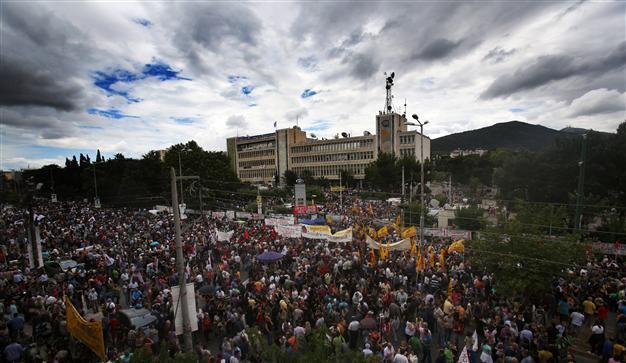Greeks strike over state TV closure, PM offers talks
ATHENS - Reuters

Thousands of protesters take part in a rally outside the Greek state television ERT headquarters during a 24-hour general strike in Athens, June 13. AP photo
Greek Prime Minister Antonis Samaras moved to defuse a political crisis over the government's abrupt closure of state broadcaster ERT that prompted a nationwide strike on June 13 and brought thousands into the streets in protest.Samaras, who has branded defenders of ERT hypocrites, invited two left-wing junior coalition parties opposed to the shutdown to talks June 17, his office said, seeking to avert political instability in the bailed-out euro zone country.
A senior government official said the conservative prime minister was open to discussing their proposals and a compromise was likely, though he did not intend to back down from closing ERT and relaunching a smaller, more efficient entity.
"I believe there is scope for compromise and we will not go to new elections," the official told Reuters.
The partners, who want ERT switched back on immediately, welcomed the meeting but kept up a critical broadside that has pushed Greece into its most serious political crisis since the uneasy right-left coalition came to power a year ago.
"The country doesn't need elections, they would be a colossal mistake, but PASOK is not afraid of them," Socialist PASOK chief Evangelos Venizelos said. "We support a radical restructuring of ERT, but not with blacked-out screens."
EBU puts ERT back again on air
In a show of support, the European Broadcasting Union (EBU) worked around ERT's shut down, putting the Greek broadcaster back on air late on June 13, enabling Greek satellite subscribers to watch the station's news channel on television.
Before the move, ERT's output was only available via a live stream on the EBU website.
The ERT crisis erupted a day after the government failed to sell natural gas firm DEPA and was cut to emerging market status by equity index provider MSCI, pushing Greek bond yields to the biggest rise in the euro zone market this week.
Athens has described the 75-year-old broadcaster's shutdown as a temporary measure pending the relaunch of a slimmed-down station. About 2,600 employees are to lose to their jobs, though the government has promised to compensate them.
Hundreds gather in front of the broadcaster
City buses did not run in Athens and train services were halted across the country after Greece's two biggest labour unions staged a 24-hour strike.
More than 13,000 protesters - including unemployed youths and leftists - gathered outside ERT's headquarters waving flags and holding banners reading "Fire Samaras, not ERT workers!"
"Samaras can't tell us what to watch or not. This isn't about ERT or about its workers any more, it's about democracy and freedom of speech," said Thanos Lykourias, 30, an office worker who earns 800 euros ($1,100) a month and lives with his mother.
Many Greeks regard ERT as a wasteful source of patronage jobs for political parties. But the abruptness with which the government pulled the plug - blacking out screens with newscasters cut off in mid-sentence - was a shock.
An indefinite strike by a journalists' union prevented some newspapers appearing and forced private broadcasters to air reruns of sitcoms and soap operas instead of the news.
















